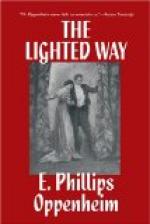“Does he know himself who committed the murder?” Arnold asked.
Sabatini smiled.
“Perfectly well,” he admitted, “but the fact helps him very little. Isaac Lalonde is rather a notable figure among European criminals. He belongs to a company of anarchists, well-meaning but bloodthirsty, who hold by one another to the death. If Starling, to save himself, were to disclose the name of the real murderer, he would simply make his exit from this life with a knife through his heart instead of the hangman’s rope about his neck. These fellows, I believe, seldom commit crimes, but they are very much in earnest and very dangerous. If you ever happen to meet one of them with a red signet-ring upon his fourth finger, you can look out for trouble.”
Arnold shivered for a moment.
“I have seen that ring,” he murmured.
“You were a spectator of the tragedy, I remember,” Sabatini agreed, pleasantly. “Now are you quite satisfied about Starling?”
“I have heard all I want to about that,” Arnold admitted.
“We come, then, to your last question,” Sabatini said. “You demand to know the meaning of the unfortunate incident which occurred in my sister’s boudoir. Here I think that I am really going to surprise you.”
“Nothing,” Arnold declared, fervently, “could surprise me. However, go on.”
“Neither Fenella nor myself,” Sabatini asserted, “have the slightest idea as to how that man met with his death.”
“But you know who he was?” Arnold asked. “You know why he was watching your house, why he seems to have broken into it?”




